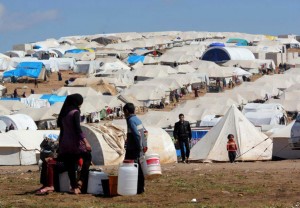UNITED NATIONS — Amid the continuing carnage from Syria’s civil war, there are small, if hard won, humanitarian victories which bring a tiny glimmer of hope to the battered and bleeding Mid East nation. Surprisingly, the UN Security Council unanimously agreed to a resolution which allows “unhindered humanitarian access” to cities, towns, and neighborhoods under siege by warring factions.
After considerable diplomatic dithering and the real threat of Moscow’s Damocles sword veto hanging over the humanitarian draft resolution, all countries, including Russia and Mainland China supported the text.

To those outside the politically rarefied climate inside the UN, the resolution sponsored by Australia, Luxemburg and Jordan, appears a humane and logical compromise beyond contention. But in a surprise Saturday meeting, the Security Council saw Moscow’s veto threat evaporate as quickly as the fog which enveloped the UN building the previous day.
Australia’s Amb. Gary Quinlan stated the obvious, “In adopting this resolution unanimously, all members of the Security Council have recognized that the humanitarian situation in Syria is desperate.”
He added, “The country has disintegrated and neighboring countries are threatened by the effects. Almost half of Syria’s population need assistance. A third of the housing has been destroyed and over 60 percent of the hospitals are destroyed or damaged.”
Amb. Quinlan added poignantly, “The Council’s core demand is that the Syrian parties to the conflict, and above all, the Syrian authorities, reverse course now and start to put the interests of Syria’s citizens first…aid must be allowed to reach all those who need it by the most direct means possible, including across battle lines and across borders. It must be allowed to those people living under siege.”
Indeed a quarter- million civilians live in besieged cities such as Aleppo where there has been no food of medical supplies in over a year. This medieval style siege prompted Valerie Amos, the UN Humanitarian coordinator to warn that “despite modest progress on the humanitarian front, the UN have not been able to reach the most vulnerable people in the country.”
Secretary General Ban Ki-moon stated strongly, “It is incumbent on the Syrian government and all parties to the conflict to reach these agreements.
Syria’s humanitarian statistics are staggering. Over 135,000 people have been killed and 9 million people (from the pre-war population of 26 million) have been driven from their homes since the start of the conflict three years ago. The UN High Commissioner for Refugees (UNHCR) states there are more than 2.4 million refugees in the region; with 932,000 in Lebanon, 574,000 in Jordan, 600,000 in Turkey and 223,000 in Iraq.
Helping the refugees and displaced falls to the international community. Indeed while the European Union member states are the biggest contributor with $3.5 billion to the aid effort, nonetheless as EU UN Ambassador Thomas Mayr Harting warned, “ there is no humanitarian solution to this crisis, there can only be a political solution as the only way to a lasting and sustainable end to the conflict.”
Yet the Ambassador conceded, “But for as long as we will not have a political solution, we must continue relentlessly working on saving lives, alleviating human suffering, and restoring dignity.
The elusive political solution sought in the recent Geneva meetings between the Syrian government and various opposition forces ended in predictable stalemate.
Though a gaggle of rebel factions oppose Syria’s Assad family dictatorship, the sad reality remains that many of the more lethal armed opposition are Al Qaida or jihadi fundamentalist fighters, highly improbable custodians of any future democracy. U.S. policy has largely aligned itself with largely militarily ineffective rebel groups.
The Islamic State in Iraq and the Levant (ISIL), a hardline movement with many foreign fighters, has divided the opposition, attacked the Christian minority, and made dangerous inroads in the balance of power.
There’s a stark but simple political calculus to ending the crisis; the domestic warring parties and their international patrons must first exhaust themselves.
Nonetheless as the UN’s Ban Ki-moon told delegates, “There must be a political transition towards a new Syria where all the people and communities are guaranteed protection, rights and freedoms.” If only it were so simple.
John J. Metzler is a U.N. correspondent covering diplomatic and defense issues. He writes weekly for WorldTribune.com. He is the author of Transatlantic Divide ; USA/Euroland Rift (University Press, 2010).


You must be logged in to post a comment Login